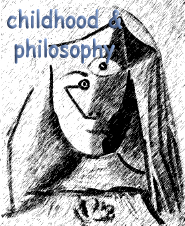philosophy (not only) with children: listening, caring, writing, transmitting
DOI:
https://doi.org/10.12957/childphilo.2020.52894Keywords:
writing, care, training, subject, love.Abstract
In this article, I intend to link four topics or essential acts of philosophical practice: listening, caring, writing and transmitting, with special attention to children--what they inspire and teach us about philosophical practice, with special attention to the situation of confinement caused by the Covid-19 pandemic. A first task is to recover the function of listening and desire, in the context of the concept and the game, and against any abuse or violence. Second, we emphasize the role of care--its expansion and reformulation in these difficult circumstances, especially in interrupting the logic of servitude and of the activity-debt-reward circuit by way of the pleasure of inquiry. Third, we practice writing as a technology of self that overcomes the dichotomy between personal and academic form, in order to become a practice of care and transmission, along with other self-practices: abstinence, self-examination, exercises, etc. Finally, we consider the question of the “Name of the Father”--how to understand the decline of patriarchy in relation to love, self-esteem, the transmission and the use of a symbolic legacy, given that the decline in question is not merely a weakening, but an unfolding of a singular-generic power that binds us together: learning to decline names, words, concepts, and traditions, which is what drives true subject formation.
Downloads
References
ALTHUSSER, Louis (2015). Iniciación a la filosofía para los no filósofos, Buenos Aires: Paidós.
BADIOU, Alain (1999). El ser y el acontecimiento, Buenos Aires: Manantial.
BUTLER, Judith (2009). Dar cuenta de sí mismos. Violencia ética y responsabilidad, Buenos Aires: Amorrortu.
FOUCAULT, Michel (1979). “La ley del pudor”, Diálogo de Michel Foucault con Guy Hocquenghem y Jean Danet durante un programa de radio dirigido por Roger Pillaudin y emitido por France Culture el 4 de abril de 1978. La transcripción fue publicada originalmente en francés con el título La loi de la pudeur en la revista Recherches, nº 37 (abril 1979). En línea: https://es.wikisource.org/wiki/La_ley_del_pudor
FOUCAULT, Michel (2014). Historia de la sexualidad, Tomo I, La voluntad de saber, Buenos Aires: Siglo XXI.
FOUCAULT, Michel (2013). Historia de la sexualidad, Tomo II, El uso de los placeres, Buenos Aires: Siglo XXI.
FOUCAULT, Michel (2015). Historia de la sexualidad, Tomo III, La inquietud de sí, Buenos Aires: Siglo XXI.
FOUCAULT, Michel (1990). Tecnologías del yo. Barcelona, España: Editorial Paidós.
FOUCAULT, Michel (2014). La hermenéutica del sujeto, Curso en el Collège de France (1981-1982), Buenos Aires: FCE.
LACAN, Jacques (2003). El estadio del espejo como formador de la función del yo [Je] tal como se nos revela en la experiencia psicoanalítica, Escritos 1, Buenos Aires, Siglo XXI.
LACAN, Jacques (2006). El seminario 23: el sinthome, Buenos Aires, Paidós.
LISPECTOR, Clarice (2016). Un soplo de vida, Madrid, Siruela.
PRECIADO, Beatriz (2009). “Terror anal” en Guy Hocquenghem, El deseo homosexual, España, Melusina.
SPINOZA, Baruch (2006). Ética demostrada según el orden geométrico, Madrid, Alianza.
STOLKINER, Alicia (2020). Muro de Facebook, 21 de junio de 2020.




